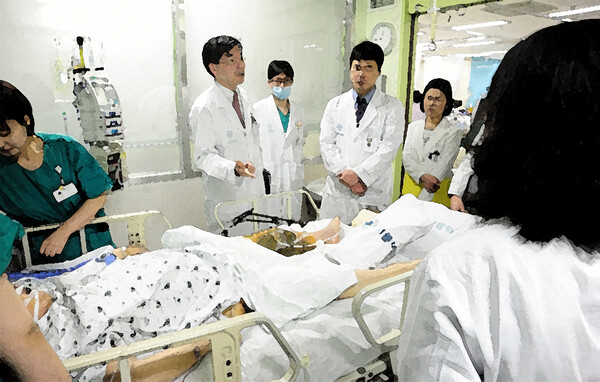The government has begun a full-scale financial injection to fill the vacancies left by interns and residents who resigned en masse to protest against the government’s increase in medical school enrollment quota.
Starting in March, for instance, the government will pay a monthly subsidy of 18 million won ($1,370) if tertiary hospitals employ a physician and 4 million won for a newly-hired nurse as part of their program to replenish medical staff.

The government said so at Wednesday's regular briefing of the Central Disaster and Safety Management Headquarters.
The government announced the “Emergency Treatment Plan” and the “Health Insurance Support Plan” to minimize the void in severe and emergency medical care caused by medical residents' absence without leave. It explained that it would inject 128.5 billion won into the reserves fund and 188.2 billion won into the state health insurance finance.
In particular, the government is strengthening the treatment of severe emergency patients and expanding compensation for emergency room medical personnel. Under the program, emergency medical institutions have received a temporary subsidy of about 70,000 won since Feb. 20 to treat an emergency patient assigned to them through the central or emergency response emergency room.
Regional and specialized emergency medical centers and regional trauma centers that provide emergency medical treatment to moderate and severe emergency patients within 24 hours have been reimbursed 150 percent more for treatment and surgery, and specialist consultation fees at regional, local, and specialized emergency medical centers and regional trauma centers have been temporarily increased by 100 percent.
This week, the government has expanded the rate of increase in the transfer fee from 30 percent to 50 percent to ensure prompt referral of mildly ill patients to appropriate hospitals and raised the added rate for emergency medical procedures, such as cardiopulmonary resuscitation, tracheal intubation, hyperbaric oxygen therapy, and hypothermia performed in emergency rooms, from 50 percent to 150 percent. It has also established a new compensation item to cover 50 percent of emergency consultation fees at local emergency medical centers.
Regarding manpower-related support, the government provides on-call allowances of up to 450,000 won per day on average for doctors, up to 900,000 won for holidays, and up to 150,000 won per day for nurses, specialists, and nurses at tertiary general hospitals.
In particular, during this month, the government plans to provide up to 18 million won per month for a newly hired doctor and up to 4 million won per month for a nurse to encourage tertiary general hospitals and public medical institutions to replenish medical personnel.
In addition, it will provide incentives for dedicated personnel who classify the severity of mild, non-emergency patients at regional emergency medical centers when referred to other medical institutions.
"We will continue to listen to the opinions of the field, including emergency medical care, and provide necessary support," the government said, leaving the possibility of further financial input open.
Related articles
- 'Void of trainee doctors, Big 5 hospitals could suffer bankruptcies in a cascade'
- SNU medical professors propose requesting foreign institute to forecast Korea's physician increase
- Exodus of medical residents forces neurological society to cancel workshop
- Court to decide whether to suspend medical student increase as early as Friday this week
- Nurses are filling in trainee doctors from today. Here’s what they can and can’t do.
- Korean trainee doctors seek ILO's intervention against government's work order mandate

